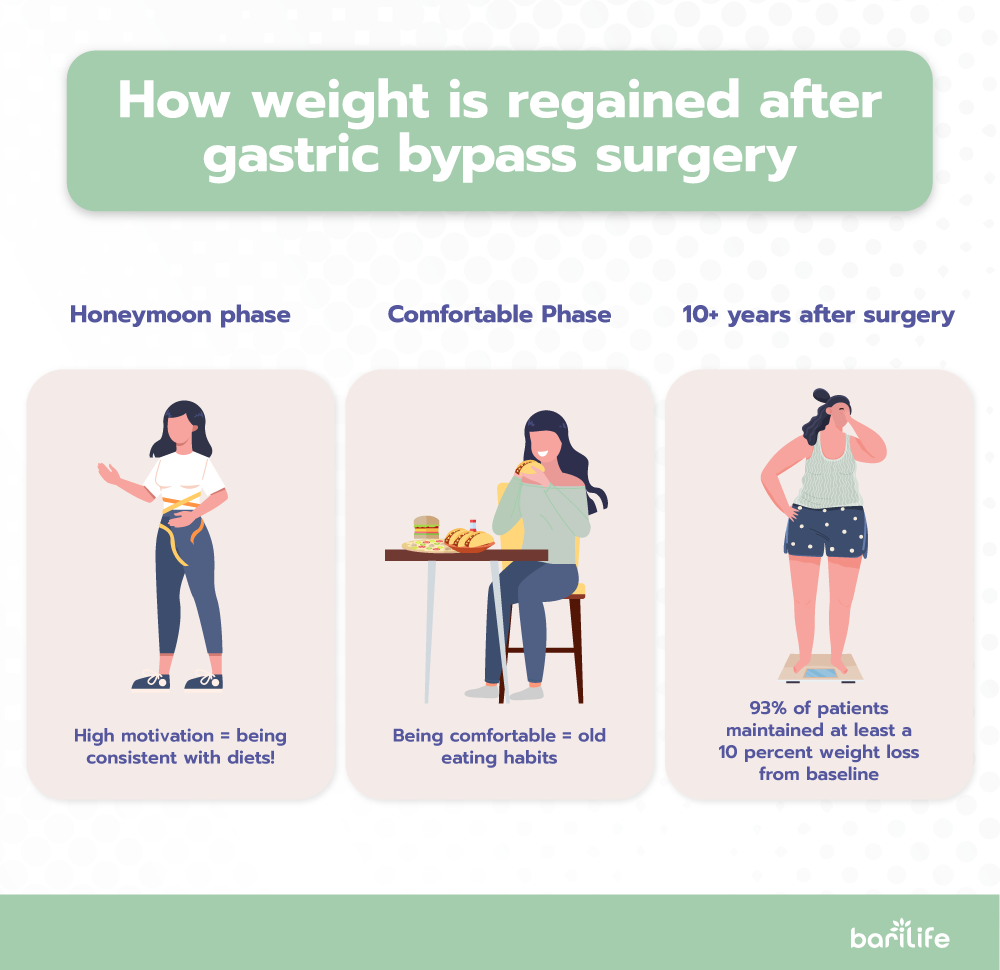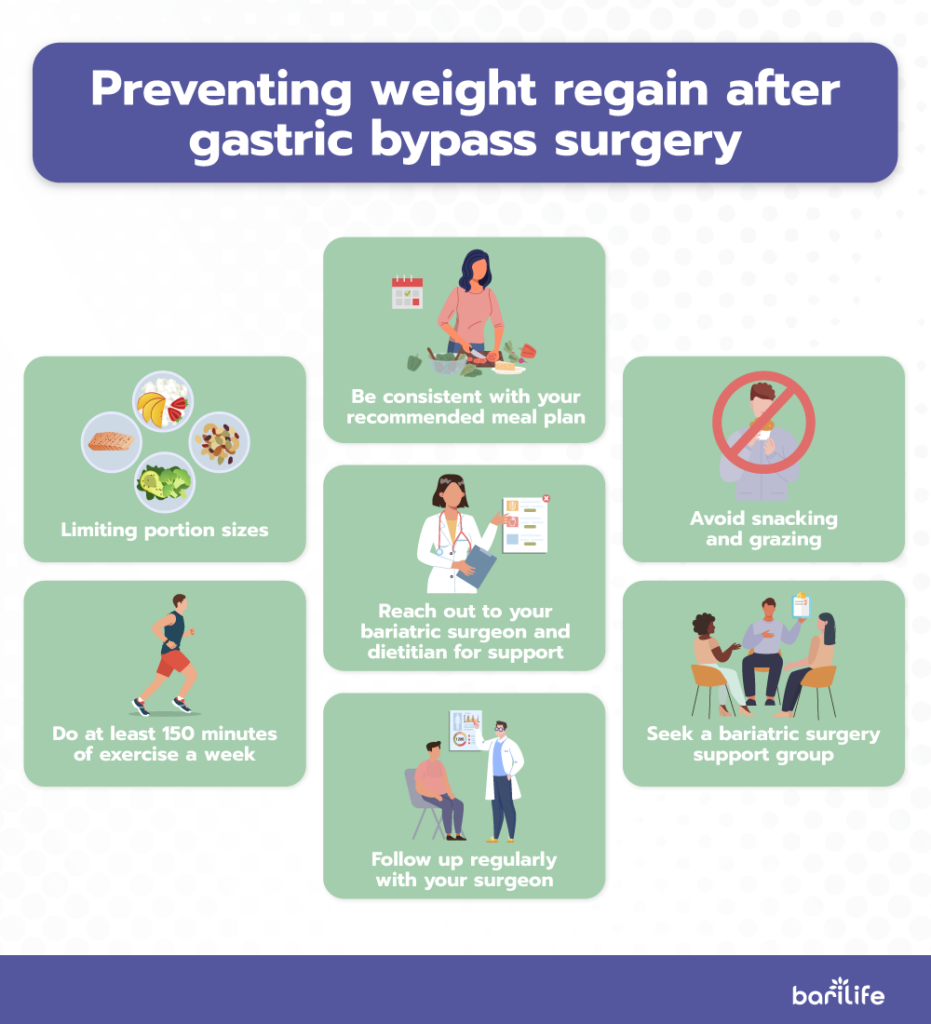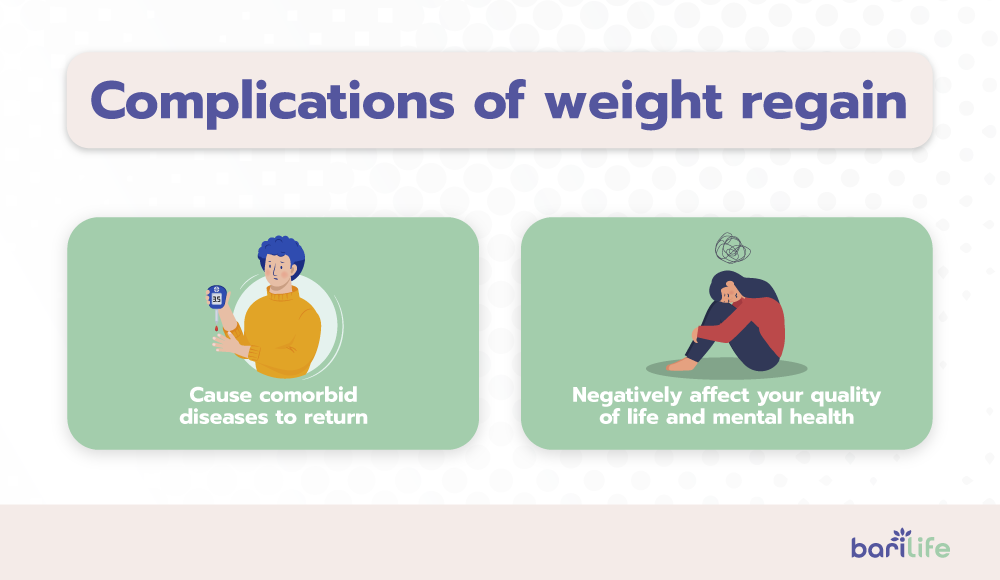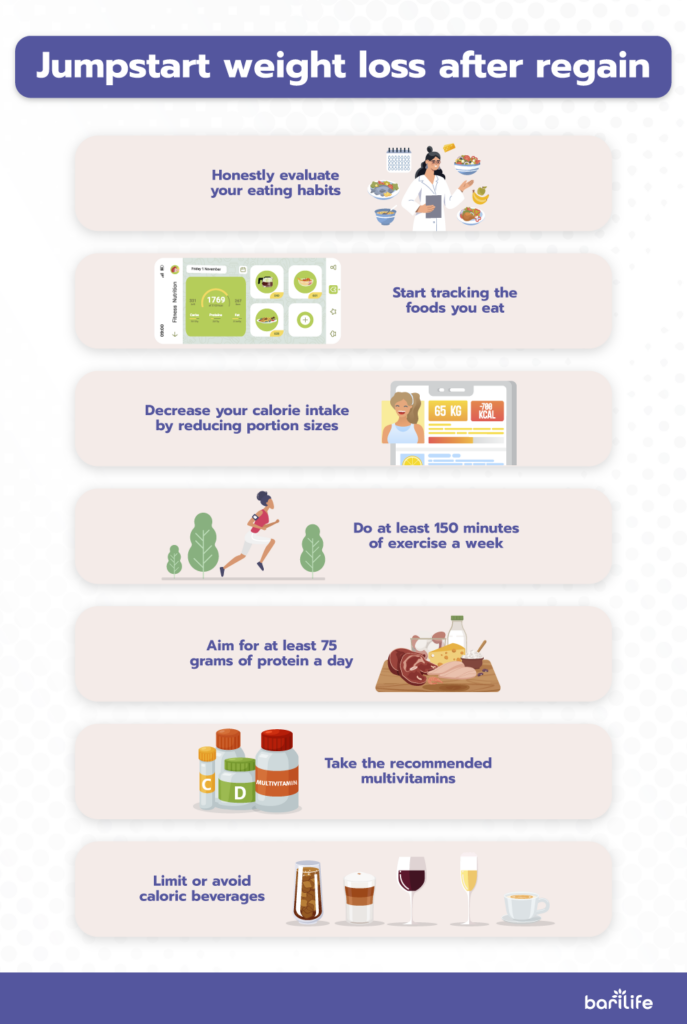You’ve had gastric bypass and started your weight loss journey strong. At first, the weight seemed to just fall off with very little effort. But now, 12 months after surgery, weight loss has slowed or maybe you’ve even gained. Weight loss plateaus after bariatric surgery are not uncommon. Often these stalls in weight loss can be corrected by adjusting diet and physical activity. If not properly addressed, plateaus can lead to weight regain.
Maintaining a proper diet and exercise routine is critical to your continued weight loss and maintenance. If you had gastric bypass surgery and met your excess weight loss goal but gained some of it back, you may be wondering what you can do to halt continued weight gain and lose the weight. Keep reading to find out more about weight gain after gastric bypass surgery and what you can do to fix it.
Gastric bypass surgery
The Roux-en-Y gastric bypass surgery, or simply gastric bypass, is considered the gold standard of bariatric surgery and is one of the most commonly performed procedures. This procedure involves creating a small pouch from the stomach and connecting the newly created pouch directly to the small intestine. After gastric bypass, food will travel down into this small pouch of the stomach and then directly into the small intestine, thereby bypassing most of your stomach and the first section of your small intestine.
Gastric bypass is often recommended to treat morbid obesity when weight loss has been unsuccessful with diet and exercise, or when you have serious health problems because of your weight.
Expected weight loss
In bariatric medicine, the term that is often used is Excess Weight Loss (EWL). EWL is defined as your current body weight minus your “Ideal Body Weight.” EWL provides context to the relationship between current weight and “ideal weight,” or your goal weight.
The average weight loss after gastric bypass surgery is about 70 percent of excess body weight within 18 months.
One month after having gastric bypass surgery, you can expect to lose about 17 percent of your excess body weight. At 3 months, patients lose on average between 25-35% of their excess body weight. Patients should lose about 45-55% by the 6-month mark. A year after gastric bypass, if you are consistent with your diet and physical activity, you should lose around 60-70% of your excess body weight.
This is only an average, so your results may vary. Your surgeon can help you determine what weight loss goals are appropriate for you.
How weight is regained after gastric bypass surgery
For the first year, often referred to as the “honeymoon phase,” motivation is high and patients have no problem adhering to nutrition and exercise recommendations. They consistently eat a diet high in protein and low in carbs and fat, while engaging in 150 minutes of activity per week at a minimum.
As patients recover from surgery and time goes on, some get comfortable and slip into their old patterns. Diet becomes more lenient and daily movement decreases. Weight loss slows and weight eventually starts to climb.
Gastric bypass patients often regain some or most of their lost weight back within 10 years. In a recent long-term study of patients who received the gastric bypass procedure, 93 percent of patients maintained at least a 10 percent weight loss from baseline, 70 percent maintained at least a 20 percent weight loss and only 40 percent maintained at least a 30 percent weight loss after 12 years.
There are many reasons that weight regain may occur after bariatric surgery. Some of them are modifiable through lifestyle behaviors, and some need to be addressed medically. Mental health, diet, exercise, hormone or metabolic imbalance, and pouch dilation are all factors that can impact weight regain.
Adopting diet and lifestyle modifications early on is highly recommended for anyone that may be at risk of poor weight loss outcomes or weight regain.

Preventing weight regain after gastric bypass surgery
Gaining weight after gastric bypass surgery is not uncommon. While weight regain after bariatric surgery can occur, there are some things you can do to prevent it. To prevent weight regain:
- Follow up regularly with your bariatric surgeon to keep weight loss on track.
- Being consistent with your recommended meal plan and eating high protein to preserve lean muscle mass, limiting carbohydrate and fat intake.
- Limiting portion sizes.
- Avoid snacking and grazing. This can disrupt regular hunger and fullness cues and lead to excess calorie intake.
- Participating in at least 150 minutes of moderate-intensity exercise per week. This should be a combination of cardiovascular and strength exercise.
- Seeking a bariatric surgery support group if you’re having difficulty adhering to the recommended lifestyle changes.
- Reach out to your bariatric surgeon and dietitian for support. They want you to be successful in maintaining your weight loss long-term. Don’t be embarrassed if you regain some weight. Obesity is a chronic, multi-faceted condition that conditions your body to gain weight.

Complications of weight regain
Another positive result of gastric bypass surgery is that comorbid diseases like diabetes, hypertension, and high cholesterol, are often improved or reversed.
When weight is regained, it can have adverse effects on your health and well-being. Gaining weight after gastric bypass surgery can:
- Cause comorbid diseases to return
- Negatively affect your quality of life and mental health
Weight gain can cause obesity-related diseases to return even if there was remission following your surgery. It is important to monitor for signs and symptoms of obesity-related diseases if significant weight gain has occurred.
Weight regain can also have a negative impact on quality of life. It is suggested that weight gain of about 15% or more led to a quality of life that was similar to the quality of life of obese people that were heavier and did not have any surgical intervention.

Jumpstart weight loss after regain
There is no cause for alarm if you gain some of your weight back after gastric bypass. There are things you can do to restart weight loss again. Returning to post-surgery behaviors can often put a stop to weight gain and help you get back on track.
- Honestly evaluate your eating habits. Have you been eating larger portions? Have you been eating out more often? Are you grazing throughout the day or binging?
- Start tracking the foods you eat (beverages, too!), so you have an accurate idea of how many calories you are consuming.
- Decrease your calorie intake by reducing portion sizes and avoiding snacks/grazing between meals.
- Limit or avoid caloric beverages.
- Aim for at least 75 grams of protein a day for men and 60 grams for women, unless otherwise specified by your surgeon or dietitian.
- Engage in a minimum of 150 minutes of moderate-intensity exercise per week. To increase weight loss, participate in 30 minutes of low-intensity exercise daily (walking, biking, yoga), and 3 days of muscle strengthening exercise per week.
- Consistently take recommended multivitamins daily.

Final thoughts
In the early months following the Roux-en-Y gastric bypass, weight loss often seems effortless. The excess weight seems to melt away during this “honeymoon phase.” However, if you don’t adhere to a proper diet and consistent exercise routine for the long-haul, weight loss plateau or even weight regain can occur.
Weight gain after gastric bypass is not uncommon, but it can be very harmful to your health. Comorbid diseases that may have improved following surgery can return if the weight lost is regained. If you have gained weight after gastric bypass surgery, you should contact your bariatric treatment team for support, along with adjusting your nutrition and exercising regularly.




What are your tips and tricks to post-bariatric success?